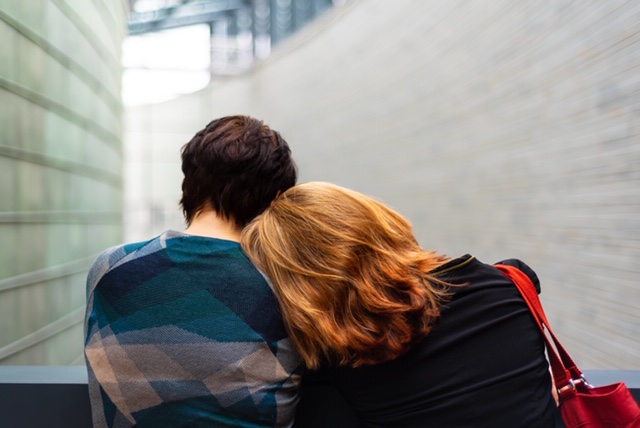I am a master at covering up my anxiety when I’m around other people. I do this for a couple of reasons.
One, it’s embarrassing. I speak a lot on breaking stigma and the importance of being vulnerable and open about mental health struggles, but when I’m in the thick of it, it’s hard to escape that shame. The shame that comes with freaking out on the inside while everyone around me is talking and joking and acting fine. It’s embarrassing to say, “Sorry, guys, I have to leave. I kinda feel like I’m dying.” Even if it’s people who love me, I’m going to feel shame. I’ll worry about them thinking they said or did something wrong. I’ll worry that they’ll finally discover just how weird I am and want nothing more to do with me. I’ll worry because, even though they have a theoretical knowledge of my anxiety, seeing it in person can be unsettling.
Two, I don’t want to kill the vibe. If everyone around me is having a good time or if things seem really chill and I jump in with “Just FYI, I’m about to have a panic attack”, it’s a bit of a buzzkill. Many people just don’t know how to react. And it’s not their fault; it’s just something they’ve never experienced. It’s foreign to them. I imagine someone who has no experience with anxiety or panic will have a similar reaction to someone having a panic attack as I would to someone having a seizure. Confusion. Helplessness. Panic.
And let me tell you, nothing throws gasoline on the anxiety fire like someone reacting to my panic with more panic.
So, if you don’t struggle with anxiety or panic, but perhaps know or love someone who does, let me give you a few general dos and don’ts. These are not across the board, of course, as everyone experiences their anxiety differently, but they are true for me and will hopefully give you more confidence in helping someone with anxiety.
Let’s start with the don’ts.
If someone is struggling with their anxiety or having a panic attack, DON’T:
- Panic. This was stated above, but it bears repeating. If I’m panicking and you start panicking then we’ll both be in a big ol’ panic cluster and it helps no one.
- Tell them to calm down. Or relax. Obviously if they could calm down, they would, SHERYL. (No offense to Sheryls, I’ve just been listening to a whole lot of Heather McMahan.
- Say “It’s all in your head.” Well no shit, ya ding-dong, it’s called a mental disorder.
- Touch me. I say don’t touch me specifically because some people find a calming touch helpful. It makes me want to punch things. It’s best to ask the person what they prefer.
- Tell them they’re being dramatic. It’s kinda hard to not be dramatic when you think you’re about to die.
- Ask “Are you okay?” Obviously they’re not.
- Make them feel bad if they have to leave. They would stay if they could. I had a friend yell at me on my birthday once because I was panicking and didn’t want to take a shot she bought me. I left and she wouldn’t talk to me for a few days. That was 10 years ago, and it still hurts.
So what does help? If someone is experiencing anxiety or panic, DO:
- Say calming things, like:
- You’re safe.
- I’m right here with you.
- I love you no matter what.
- Take your time.
- Ask how you can help. Like I said, everybody experiences anxiety and panic differently. If they say they don’t know, then you can ask something like “Would it help if I sat here (or took a walk) with you?”
- Distract and ground them by asking sensory questions like “What are 2 things you hear right now?” or “Can you name 3 things you see?” You can also offer them a cold rag or a glass of water. This is called grounding and can help a person get outside of their own mind and back into their body.
- Have compassion. Extreme anxiety and panic always passes, but it feels like hell while it’s happening. A kind word and some reassurance that we’re still loved helps us recover and not feel ashamed.
- Check on them after it has passed. I had a panic attack the other night and my friend, Erica, texted me multiple times the next day to ask how I was feeling. It helped so much to know that even though she doesn’t experience panic attacks, she still cared about how I was recovering.
Of course, each person has their own list of dos and don’ts regarding their mental health. Living with a mental health disorder can be an isolating and lonely experience, but it helps so much when we know we have people on our side. Try sharing this post with the person you love who experiences anxiety or panic and see what resonates with them. Would they add anything? Is there anything they would change? Just the simple act of showing that you’re trying to understand what they’re going through will mean the world.






